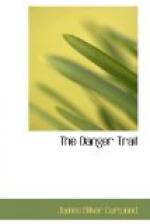In a flash Howland stepped a little to one side and shot out a crashing blow that caught Jean on the side of the head and sent him flat on his back. Half-stunned Croisset came to his feet. It was the first time that he had ever come into contact with science. He was puzzled. His head rang, and for a few moments he was dizzy. He darted in again, in his old, quick, cat-like way, and received a blow that dazed him. This time he kept his feet.
“I am sure now that I am going to kill you, M’seur,” he said, as coolly as before.
There was something terribly calm and decisive in his voice. He was not excited. He was not afraid. His fingers did not go near the weapons in his belt, and slowly the smile faded from Howland’s lips as Jean circled about him. He had never fought a man of this kind; never had he looked on the appalling confidence that was in his antagonist’s eyes. From those eyes, rather than from the man, he found himself slowly retreating. They followed him, never taking themselves from his face. In them the fire returned and grew deeper. Two dull red spots began to glow in Croisset’s cheeks, and he laughed softly when he suddenly leaped in so that Howland struck at him—and missed. He knew what to expect now. And Howland knew what to expect.
It was the science of one world pitted against that of another—the science of civilization against that of the wilderness. Howland was trained in his art. For sport Jean had played with wounded lynx; his was the quickness of sight, of instinct—the quickness of the great north loon that had often played this same game with his rifle-fire, of the sledge-dog whose ripping fangs carried death so quickly that eyes could not follow. A third and a fourth time he came within distance and Howland struck and missed.
“I am going to kill you,” he said again.
To this point Howland had remained cool. Self-possession in his science he knew to be half the battle. But he felt in him now a slow, swelling anger. The smiling flash in Jean’s eyes began to irritate him; the fearless, taunting gleam of his teeth, his audacious confidence, put him on edge. Twice again he struck out swiftly, but Jean had come and gone like a dart. His lithe body, fifty pounds lighter than Howland’s, seemed to be that of a boy dodging him in some tantalizing sport. The Frenchman made no effort at attack; his were the tactics of the wolf at the heels of the bull moose, of the lynx before the prongs of a cornered buck—tiring, worrying, ceaseless.
Howland’s striking muscles began to ache and his breath was growing shorter with the exertions which seemed to have no effect on Croisset. For a few moments he took the aggressive, rushing Jean to the stove, behind the table, twice around the room—striving vainly to drive him into a corner, to reach him with one of the sweeping blows which Croisset evaded with the lightning quickness of a hell-diver. When he stopped, his breath came in wind-broken gasps. Jean drew nearer, smiling, ferociously cool.




